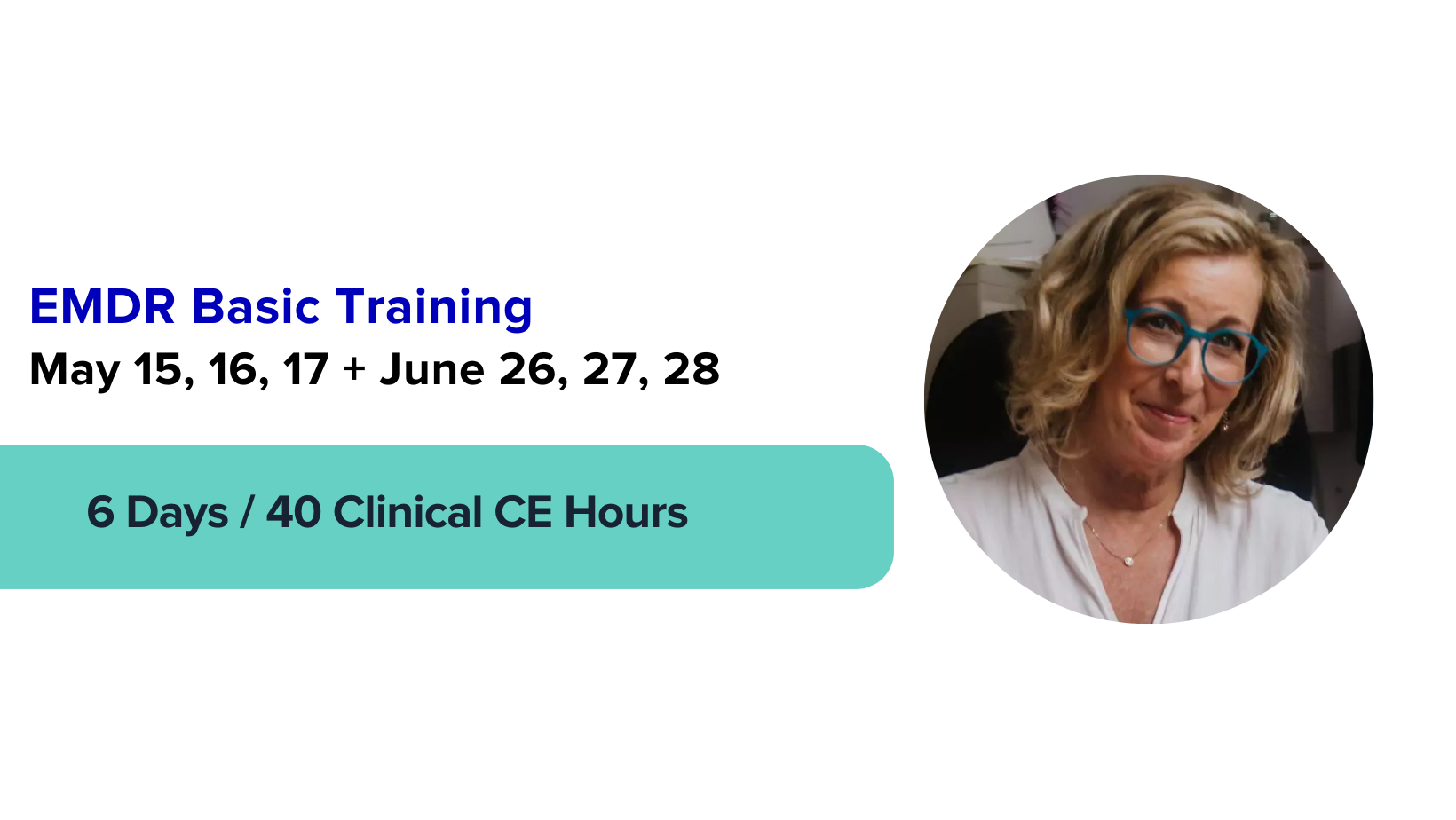Spring EMDR Basic Training

Spring EMDR Basic Training
- EMDR Basic Training Fee
- $1800
- EMDR Basic Training Fee: Non-Profit Therapists + Graduate Students
- $1400
Get more time to pay.

- EMDR Basic Training Fee
- $1800
- EMDR Basic Training Fee: Non-Profit Therapists + Graduate Students
- $1400
Presented By
-
 Carol Miles, MSW, LCSWMore Info
Carol Miles, MSW, LCSWMore Info
Brought to You By
Dates and Times
-
-Live Webinar
-
-Live Webinar
-
-Live Webinar
-
-Live Webinar
-
-Live Webinar
-
-Live Webinar
Location
-
Live WebinarAccess virtually on TPN.health
40 CE Hours + 10 Consultation Hours = 50 Training Hours
Experience the transformative power of EMDR therapy with Three Rivers Training Center, led by Carol Miles, an EMDRIA-approved EMDR Therapy Basic Trainer. Our comprehensive program, approved by APA, social work, nursing, and mental health boards, equips you with the skills and knowledge to safely and effectively treat clients using this evidence-based approach.
Immerse yourself in learning:
- – Interactive lectures: Gain a deep understanding of EMDR theory and protocol.
- – Live demonstrations: Witness clinicians in action, observing diverse applications.
- – Supervised practice: Refine your skills under the guidance of experienced EMDRIA-approved consultants.
- – Regularly updated curriculum: Stay current with the latest research and clinical practices.
Empower yourself to help others:
- – Develop confidence in using EMDR for a wide range of challenges, including trauma, anxiety, phobias, and depression.
- – Learn to tailor treatment to each client’s unique needs, ensuring sensitive and effective care.
- – Foster lasting resilience and healing in your clients, witnessing their transformation first-hand.
This is a beginner-level program for all mental health professionals.
Please Note: EMDR Basic Training is the first step for becoming EMDR Certified but being an EMDR trained clinician does not certify you in EMDR. You can begin using EMDR Therapy once you begin the basic training. EMDR Certification is a separate step after completing basic training and is an important step you may choose to further your professional development.
- • Social Worker
- • Marriage & Family Therapist
- • Counselor
- • Substance Use Disorder Professionals
The educational goal of this course is to increase knowledge about EMDR Therapy.
-
Adler-Tapia, R., & Settle, C. (2017). EMDR and the art of psychotherapy with children: Infants to adolescents treatment manual. New York, NY: Sringer Publishing company, LLC.
-
EMDR International Association. (Fall 2020). EMDR and racial trauma. Go With That, 25 (3), 1–40.
-
Grimmett, J., & Galvin, M. D. (2015). Clinician experiences with EMDR: Factors influencing continued use. Journal of EMDR Practice and Research, 9(1), 3–16. https://doi.org/10.1891/1933-3196.9.1.3
-
Lee, C.W., & Cuijpers, P. (2013). A meta-analysis of the contribution of eye movements in processing emotional memories. Journal of Behavior Therapy & Experimental Psychiatry, 44, 231-239.
-
Knipe, J. (2018). EMDR toolbox: Theory and treatment of complex PTSD and dissociation. 2nd edition, Springer Pub.
-
Moreno-Alcázar A., Treen D., Valiente-Gómez A., Sio-Eroles A., Pérez V., Amann B. L., et al. . (2017). Efficacy of eye movement desensitization and reprocessing in children and adolescents with post-traumatic stress disorder: a meta-analysis of randomized controlled trials. Front. Psychol. 8:1750. 10.3389/fpsyg.2017.01750
-
Shapiro, F. (2018). Eye Movement Desensitization and Reprocessing (EMDR) Therapy: Basic Principles, Protocols, and Procedures. Guilford Press.
-
Watts, B.V. et al. (2013) Meta-analysis of the efficacy of treatments for posttraumatic stress disorder. Journal of Clinical Psychiatry, 74, e541-550. doi: 10.4088/JCP.12r08225
-
Wheeler, K. (2022). Eye Movement Desensitization and Reprocessing Therapy, chapter 7, pp 329-359 in Psychotherapy for the Advanced Practice Psychiatric Nurse: A how-to for evidence-based practice. 3rd edition. Springer Pub.
TPN.health is approved by the California Association of Marriage and Family Therapists (Provider #1000101) to sponsor continuing education for LCSWs. TPN.health maintains responsibility for this program/course and its content. Course meets the qualifications for 40 hours of continuing education credit for LCSWs as required by the California Board of Behavioral Sciences.
Trusted Provider Network, LLC is recognized by the New York State Education Department’s State Board for Social Work as an approved provider of continuing education for licensed social workers #SW-0654.
TPN.health, #1766, is approved to offer social work continuing education by the Association of Social Work Boards (ASWB) Approved Continuing Education (ACE) program. Organizations, not individual courses, are approved as ACE providers. State and provincial regulatory boards have the final authority to determine whether an individual course may be accepted for continuing education credit. TPN.health maintains responsibility for this course. ACE provider approval period: 03/31/2022 – 03/31/2025. Social workers completing this course receive 40 General continuing education credits.
Trusted Provider Network, LLC is recognized by the New York State Education Department’s State Board for Mental Health Practitioners as an approved provider of continuing education for licensed marriage and family therapists #MFT-0097.
TPN.health is approved by the California Association of Marriage and Family Therapists (Provider #1000101) to sponsor continuing education for LMFTs. TPN.health maintains responsibility for this program/course and its content. Course meets the qualifications for 40 hours of continuing education credit for LMFTs as required by the California Board of Behavioral Sciences.
Trusted Provider Network, LLC is recognized by the New York State Education Department’s State Board for Mental Health Practitioners as an approved provider of continuing education for licensed mental health counselors. #MHC-0220.
TPN.health is approved by the California Association of Marriage and Family Therapists (Provider #1000101) to sponsor continuing education for LPCCs. TPN.health maintains responsibility for this program/course and its content. Course meets the qualifications for 40 hours of continuing education credit for LPCCs as required by the California Board of Behavioral Sciences.
TPN.health has been approved by NBCC as an Approved Continuing Education Provider, ACEP No. 7267. Programs that do not qualify for NBCC credit are clearly identified. TPN.health is solely responsible for all aspects of the programs.
This course has been approved by TPN.health, as a NAADAC Approved Education Provider, for educational credits. NAADAC Provider #198061, TPN.health is responsible for all aspects of the programming.This course has been approved by TPN.health, as a NAADAC Approved Education Provider, for educational credits. NAADAC Provider #198061, TPN.health is responsible for all aspects of the programing. Counselor Skill Group: Ethical and Professional Development, Legal

